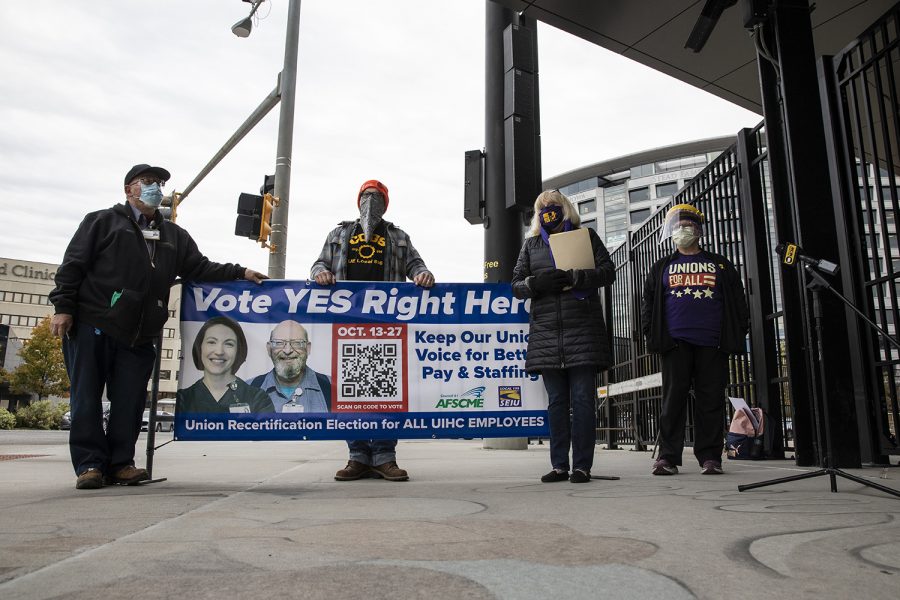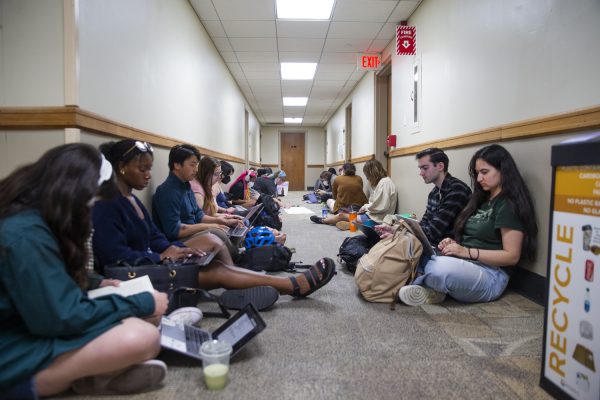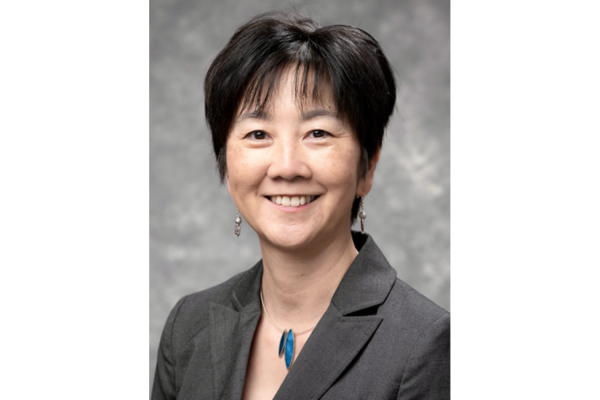University of Iowa unions vote to recertify
SEIU, AFSCME, and COGS will continue to represent workers at the university after members voted to recertify the unions.
President of SEIU local 199 Cathy Glasson answers questions during a press conference announcing the results of recertification elections for SEIU, AFSCME, and UE local unions across the street from the University of Iowa hospitals and clinics on Tuesday, October 27, 2020. The state requires that the unions vote to confirm the continuation of each union. This is the first time all three have voted simultaneously to recertify.
October 27, 2020
The three unions representing workers at the University of Iowa – Service Employees International Union, American Federation of State, County and Municipal Employees, and the Committee to Organize Graduate Students – will continue to have bargaining power after a majority of members voted to recertify all of the groups.
An Iowa law passed in 2017 requires unions to hold a recertification election each time a new contract is negotiated. Half of the union must vote yes to recertify, and any member who does not vote is counted as a no vote.
COGS, the union representing graduate student employees at the UI, last voted to recertify in October of 2018, when 1,559 graduate students voted yes, and 11 voted no.
This year, roughly 1,330 out of 1,827 graduate students voted in the recertification election, COGS president John Jepsen said. He said the pandemic made it difficult to go out and canvass voters in the same way COGS did in 2018.
“I’m happy with the results we got. If anything, the difficulty comes from – a lot of people are unaware of these kinds of things,” Jepsen said. “The university’s messaging around it was almost zero. So, it really was up to us to raise the profile around the election happening at all.”
Eleven graduate students voted no to recertifying the union.
According to a press release from SEIU Local 199, workers voted 2,828 to 38 to recertify the union.
SEIU Local 199 represents more than 4,000 workers, including nurses at UIHC. President of SEIU Local 199 Cathy Glasson said the vote indicates strong support for collective bargaining.
“This is great news for every Iowan, because these are the frontline workers who have been delivering care and essential services during the COVID-19 pandemic,” Glasson said. “This victory sends a loud and clear message to the Iowa Board of Regents that we are united and we will use our collective power to advocate for the people we serve and the patients that we care for.”
RELATED: Unions at Iowa universities vote to recertify for bargaining power, frustrated with election process
Union leaders have expressed frustration with the requirement to recertify. As previously reported by The Daily Iowan, the elections can be costly. Unions are required to pay $1.50 for every member of the bargaining unit to cover the cost of the vote.
“We’ve won both times and I guarantee you we’ll win again, but we need to call this out for what it is,” Jepsen said. “This is a waste of time. This is a waste of money. It’s meant to bust unions.”
AFSCME, which represents 4,600 UI staff and workers and service and maintenance workers at UIHC, is represented by several different bargaining units, according to a press release. Statewide, members voted 99.4 to 0.6 percent to recertify.
President of AFSCME Local 12 Richard Frauenholz said this is the union’s second time recertifying since the 2017 law changing collective bargaining practices went into effect.
“Each year we have overwhelmingly met their goal and recertified,” he said. “Enough is enough. We need the legislature or the governor to step up, look at this and say ‘Employees want this. Why are we making them do this crap every two years?’”






















